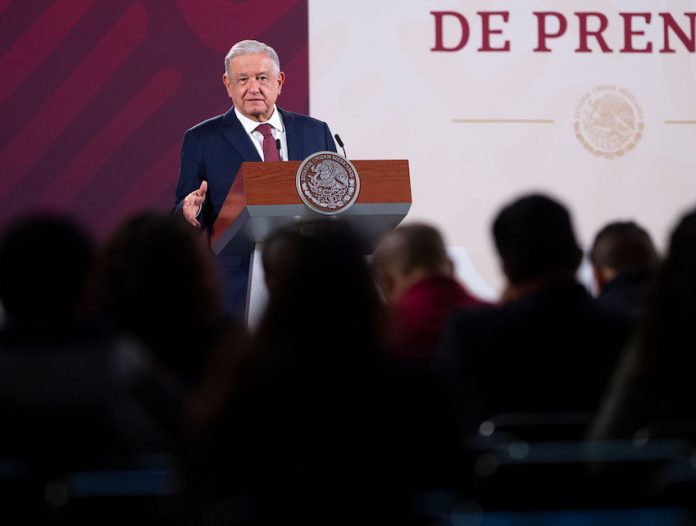Before returning to Mexico City from an Easter break on his ranch in Palenque, Chiapas, President López Obrador took a moment to record a video message for his social media followers.
“We’re saying goodbye to the ceiba trees, to the soursop tree, to the mamey tree, to the palo de tinte [tree], to the birds, to the howler monkeys, to the macaws,” he said.
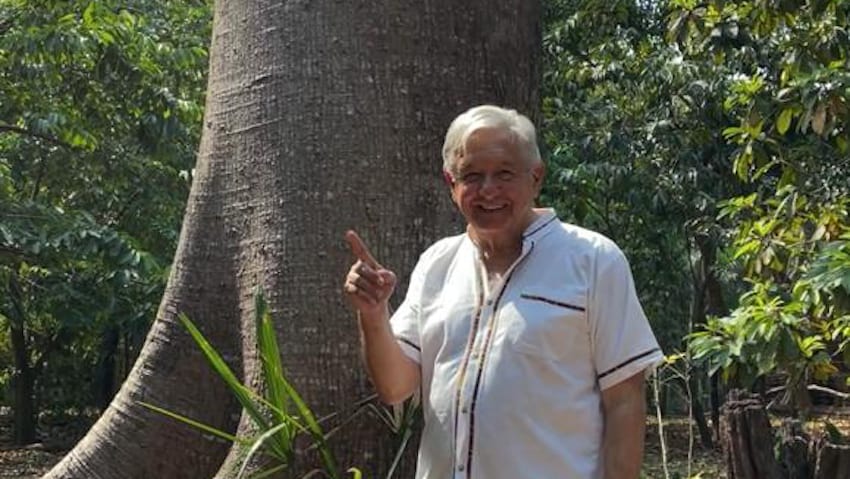
“We’ll be at the mañanera tomorrow, even though the conservatives want to prohibit it,” AMLO said, referring to his weekday morning press conference and his critics and political adversaries, respectively.
“They’re intolerant. They want to be the only ones to talk — they don’t want all of us to speak,” he said. “But they won’t be able to [ban the pressers]. See you tomorrow, at the mañanera.”
Monday
“Good morning. There have been, there are and there will always be mañaneras,” López Obrador remarked at the top of his presser before breaking into a hearty laugh.
He went on to note that it was the (104th) anniversary of the assassination of the “great campesino leader” Emiliano Zapata, a hero of the Mexican revolution.
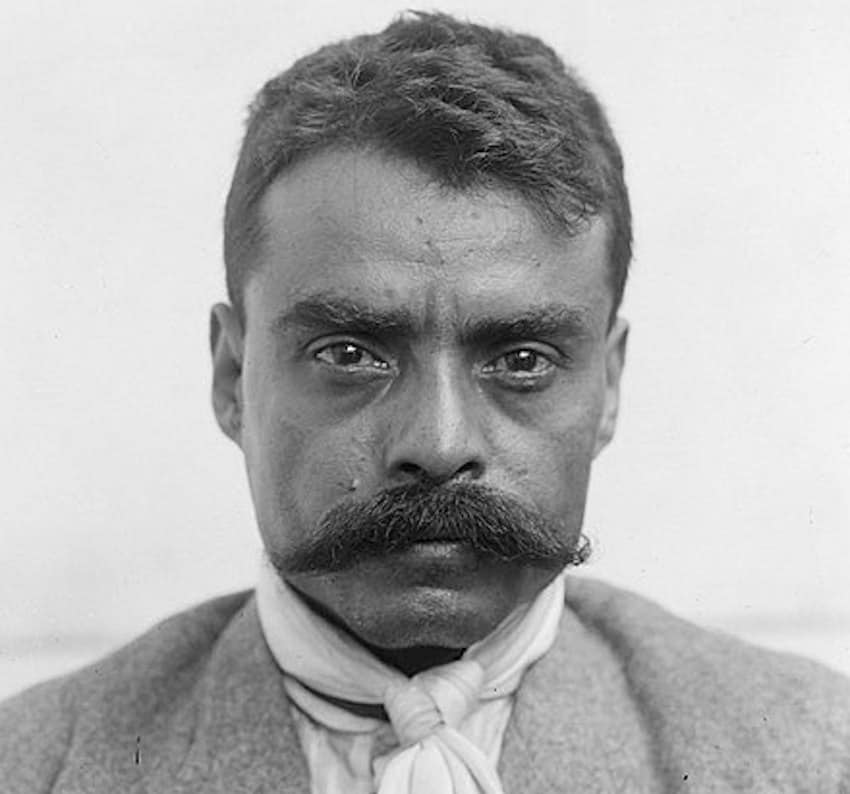
“Zapata is the pioneer of the agrarian movement in Mexico. He first called on his people … in Ayala, [Morelos], to take up arms to confront the dictatorship of Porfirio Díaz that protected the latifundistas, the large landowners,” AMLO said. “It’s time to remember that in the Porfiriato, the estates encroached on the land of the people.”
Back at the mañanera for the weekly Maya Train update, the director of the National Tourism Promotion Fund said that tracks along 200 kilometers of the 239-kilometer Izamal-Cancún section have been laid.
Section 4 of the 1,554 kilometer railroad — the entirety of which is slated to open in December — “goes through nine municipalities, 17 localities in Yucatán and Quintana Roo,” Javier May Rodríguez said.
“It has three stations, at Chichén Itzá, Valladolid and Cancún Airport,” he said without mentioning the Izamal terminus.

“There are also two stops, Nuevo Xcán and Leona Vicario. … Near Chichén Itzá, there will be a Maya Train hotel,” May added.
“… Along Section 4 [and in nearby areas] passengers will be able to enjoy true natural paradises and zones of great archaeological wealth — Chichén Itzá, [Isla] Holbox, Isla Mujeres, the beaches of Cancún, the Sotuta caves, Río Lagartos and Las Coloradas, to name some of the places.”
Welfare Minister Ariadna Montiel Reyes reported that almost 177,000 people are participating in the Sembrando Vida (Sowing Life) tree-planting employment program in the five states through which the Maya Train will run: Tabasco, Chiapas, Campeche, Yucatán and Quintana Roo.
“As you know, this program is the largest reforestation program in the world, and the goals have been achieved, particularly in the southeast,” she said.
During his engagement with reporters, AMLO acknowledged a Chinese government spokesperson’s assertion that illicit fentanyl isn’t sent from China to Mexico but added that his government still hasn’t received a “formal response” to the letter he sent to President Xi Jinping to seek his support in the fight against the synthetic opioid.
“We want to establish communication with the government of China, with the Ministry of Foreign Affairs, with the embassy. The foreign affairs minister [Marcelo Ebrard] is already doing this in order to have a clear position about the pronouncement the government of China made,” he said.
“We have to find out where fentanyl is made. If it’s not made in China, where is it made? What is known is that it is used and causes a lot of harm in the United States. … Obviously, more than what is required for medical purposes is made. So where is this surplus being made? I’ll make it clear again that fentanyl isn’t made in Mexico, the raw material for fentanyl isn’t made [here],” López Obrador said.
The president was later asked about the withdrawal from the Mexico City Metro of the National Guard (GN), whose troops were deployed to the subway system in January following a series of “atypical” incidents including a collision between two trains in which one person was killed.
“There were indications of acts of bad faith, so it was decided that the National Guard would protect and keep an eye on [the Metro system], but the situation normalized. … Fortunately the accidents — real or provoked — decreased … so [the GN troops] are gradually withdrawing,” López Obrador said.
Among other remarks, the president noted that a global survey on happiness was recently carried out and that “Mexico did well.”
Mexicans are among the happiest people in the world, AMLO said. Mexico ranked as the 36th happiest country among 137 nations included in the World Happiness Report.
“I’m saying this because our adversaries, the conservatives, will get angry. ‘It’s not true,’ they’ll say. Of course … they didn’t respond that they’re happy … but the majority of people are happy, and that’s very good,” he said.
Tuesday
Newly-designated addiction prevention czar Hugo López-Gatell took center stage early in the press conference to discuss the dangers of drugs.
“The use of drugs, the abuse of drugs and drug addiction are different stages in a very complex process,” the deputy health minister said during the newly minted mañanera segment called “Social Prevention of Addictions.”
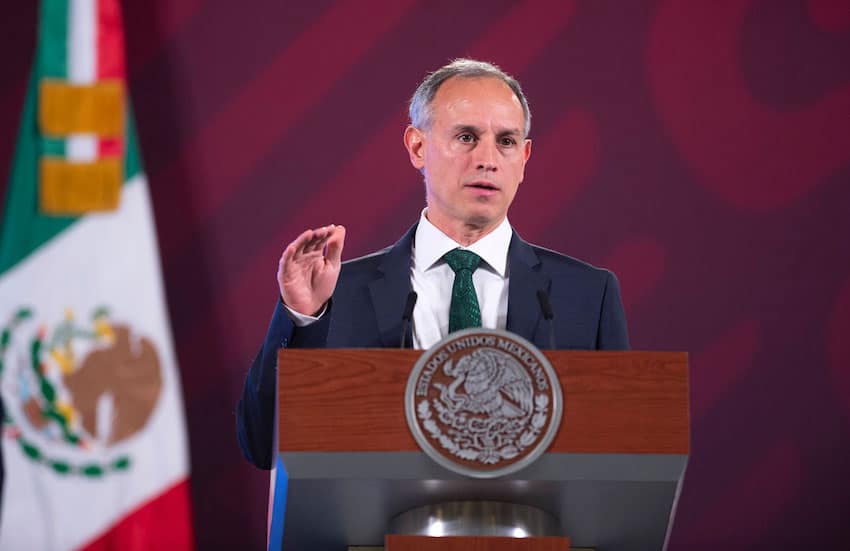
“…It’s important to consider that the problem of [drug] use, abuse and addiction … is related to the loss of opportunities, the loss of spaces for social integration, especially for young people,” he said.
“… Today, we’re going to begin by speaking about fentanyl, one of the most dangerous drugs due to the enormous potential for addiction. It’s immediately addictive even in small doses, and it has very serious effects on health and a great capacity to cause overdose and death,” López-Gatell said.
“In the future, we’ll talk about other drugs that are used more frequently in Mexico. Methamphetamines [or] crystal, for example, alcohol, cannabis or marijuana, benzodiazepines and many others.”
Director of the Mexican Social Security Institute (IMSS) Zoe Robledo later reported that 24 of Mexico’s 32 federal entities have joined the universal health care scheme, called IMSS-Bienestar.
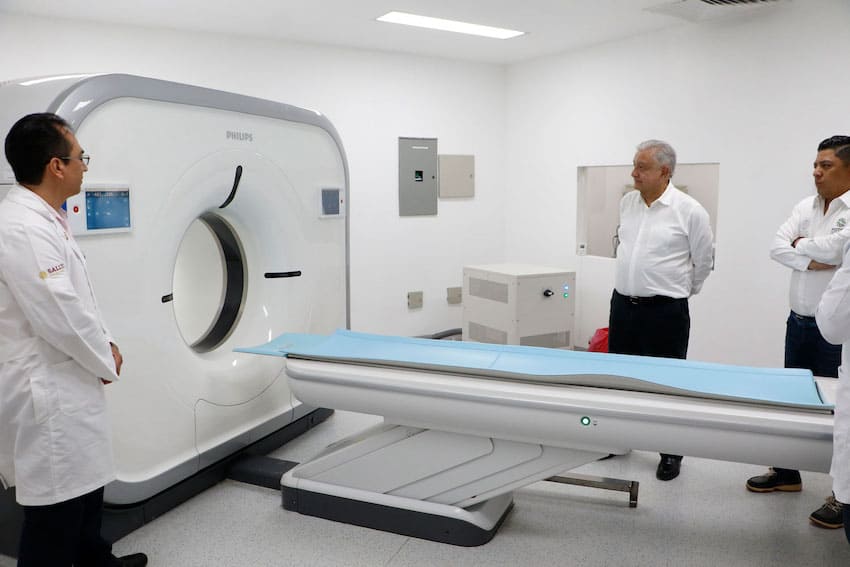
“Today, April 11, marks one year … [since] the IMSS-Bienestar health plan was presented to all the country’s governors, and fortunately a year later, 24 states are at different stages of its implementation,” Robledo said.
He said that some of the IMSS-Bienestar funding has been used to refurbish 30 operating rooms in 24 public hospitals in 11 states.
“By increasing the number of specialists, increasing the provision of supplies for surgeries and obviously increasing the number of operating rooms, more surgeries are performed,” Robledo said.
Back behind the mañanera lectern, AMLO reiterated his view that the government’s decision to purchase 13 power plants from Spanish energy company Iberdrola was a “very good” one and rejected claims that some are “junk” due to their advanced age.
The average remaining useful life of the 13 plants is three times longer than that of Federal Electricity Commission plants (CFE), he said. “In other words, they’re newer than … the CFE plants,” López Obrador said.
He said that the US $6 billion deal with Iberdrola could be completed in 45 days and predicted that the CFE, which will run the 13 plants, will next year increase its share of the electricity generation market to 65%, up from just under 40% currently. Ten percent of that 65% figure will come from new construction and the rehabbing of hydropower plants.
AMLO later said he had become aware that five days before the end of the 2012–18 government of former president Enrique Peña Nieto, health regulator Cofepris granted 63 permits to “commercialize products derived from cannabis,” with some being awarded to companies linked to the family of ex-president Vicente Fox, a prominent entrepreneur in the sector.
“These kinds of things are discovered every day. And, of course, a complaint will be filed,” he said.
“… The director of Cofepris informed me yesterday [about this] because there were basements there in [the Cofepris offices], and they’re discovering things,” López Obrador said.
Fox has denied having any such permits. In a post to his Twitter account later on Tuesday, Fox called the president “the great liar of the mañaneras” and challenged him to “present proof or shut up.”
Before bringing his second presser of the week to a close, AMLO noted that the Health Ministry was considering declaring an end to the “COVID-19 health emergency.”
“They already did this in the United States,” he said, referring to a resolution signed by President Joe Biden on Monday. “… [We’ll do] what is most advisable for the people of Mexico.”
Wednesday
The recurring “Who’s Who in the Lies of the Week” segment — presented every Wednesday by government media monitor Ana García Vilchis — is only a “summary” of some of the latest fake news, López Obrador stressed at the start of his mañanera, explaining that it would take the length of the entire press conference, if not “several days,” to expose all the falsehoods published by the press.
“That’s all we’d be talking about. We wouldn’t take care of our duties as public servants,” he said.

The “manipulation” of information by the media is a “general trend” in Mexico and around the world,” AMLO asserted.
“The press in the United States is very scandalous, biased, closely linked to interests at the peaks of economic and political power. We’re talking about the influential, famous press: The New York Times, The Wall Street Journal, The Washington Post.”
Rather than rebutting spurious reporting, García initially chose to focus on a tweet published by ex-president Fox in which he asserted he has no “cannabis license.”
“Fox isn’t telling the truth,” she said after acknowledging AMLO’s assertion that the family of the former president was granted permits to commercialize cannabis products just before Enrique Peña Nieto’s presidency came to an end in 2018.
A total of 65 permits — two more than the number cited by López Obrador — were issued by Cofepris in the last days of the Peña Nieto administration, and some of those went to companies linked to Fox, García said.
Cofepris official Bertha María Alcalde subsequently said that actions had been taken against officials who issued the “irregular authorizations” with “surprising speed” in the final days of Peña Nieto’s government.
The Cofepris official who signed the 65 permits was dismissed and disqualified from working in the public sector and an application for the revocation of the permits has been filed with the Federal Tribunal of Administrative Justice, she said.
López Obrador was immediately asked about the criminal case against National Immigration Institute (INM) chief Francisco Garduño when he opened up his presser to reporters.
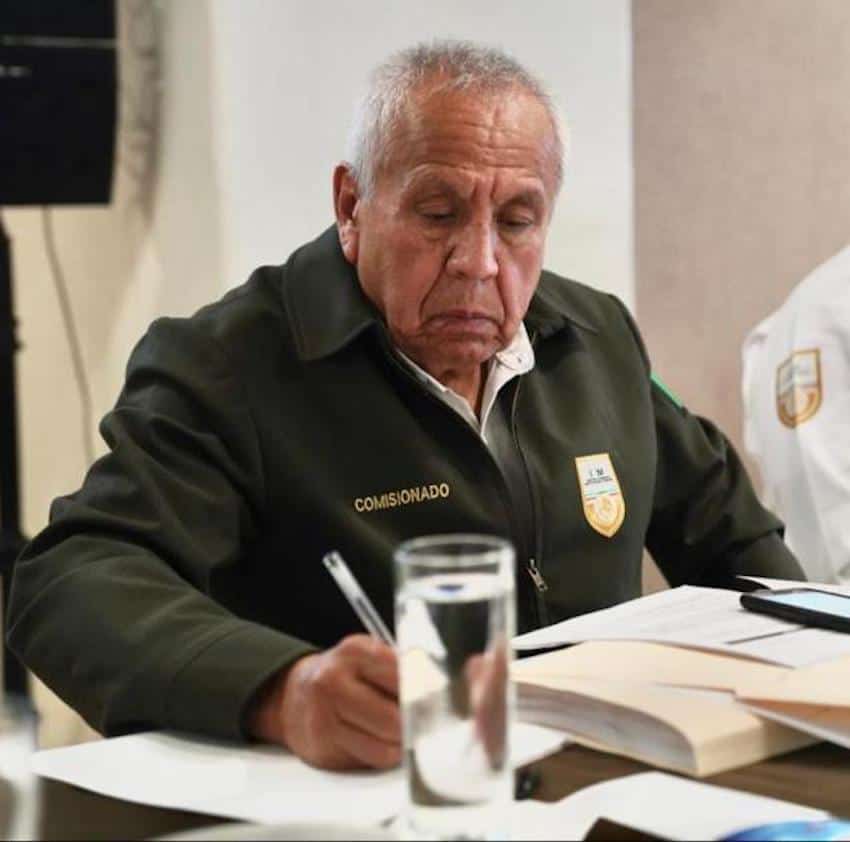
“There is an investigation that includes … Garduño in the regrettable case of the loss of [40] migrants’ lives in Ciudad Juárez,” AMLO said, referring to the March 27 fire in an INM detention center.
“We don’t yet know … the accusation against him because there are various people involved,” he said.
“The Attorney General’s Office needs to provide more information about the investigation,” López Obrador said, adding that judges will have the ultimate responsibility of ensuring that justice is served.
He said that Garduño would remain at the helm of the INM for the time being and that the government would make a decision about his future in due course.
The president later revealed that he had shelved his proposal to allow foreign airlines to fly domestic routes in Mexico. A bill to reform the nation’s aviation law sent to Congress at the end of last year no longer seeks the authorization of cabotage for foreign airlines, he said.
Those who were concerned about the proposal can celebrate, AMLO said.
Toward the end of his presser, the president said he was “extremely happy” about the Senate’s decision to award its prestigious Belisario Domínguez medal to lauded writer Elena Poniatowska, who is perhaps best known for her account of the 1968 Tlatelolco massacre of protesting students.
“Well deserved, well deserved,” AMLO said.
Thursday
Responding to his first question of the day, AMLO declared that it was “completely reprehensible” that a person who occupied the position of president of Mexico had decided to dedicate himself to the commercialization of marijuana.
“[Vicente Fox] has a ranch [in Guanajuato]. … Can’t he plant corn, wheat, vegetables? Why the business of selling drugs? he asked.
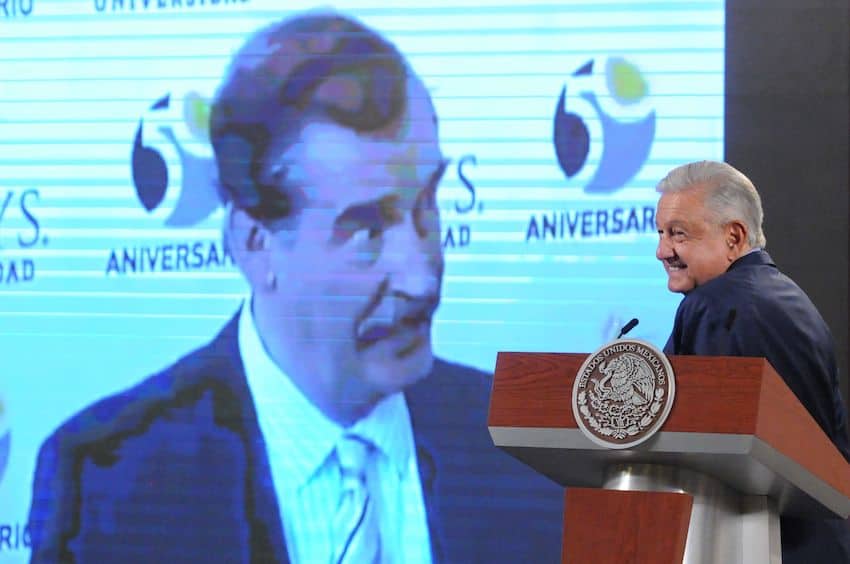
The president later defended his proposed reform to the Mining Law, saying its aim is to protect water and prevent “the monopolization of large tracts of … subsoil for mining exploitation.”
Mexico’s five previous presidents all “handed over” land to mining corporations, López Obrador said.
“They handed over 60% of national territory, 120 million hectares,” he asserted, repeating figures that have previously been disproved.
One reporter asked the president about a water supply problem in the city of San Luis Potosí, saying that “official data” from the National Water Commission (Conagua) showed the state capital would be left without water in fewer than 45 days.
“I’m going there tomorrow. I’m going to San Luis Potosí, and I’m going to deal with this issue,” AMLO said after the reporter explained that the main source of water for the city — a dam in Guanajuato state — is losing over 600 liters of water per second due to leaks and that a pipeline that transports water from the dam has had 28 “breakdowns” in the last 18 months.
“I’m going to speak with the governor. … We always help. … Germán Martínez from Conagua [the National Water Commission] is probably listening and … he’ll send me all the information about this matter, and we’ll help,” he said.

“It’s a good thing I’m going tomorrow. That’s why … [my] weekend tours are good, because one is constantly traveling around the whole country, and that helps me a lot, it helps us to have communication with local authorities, with the people, and to attend to problems, the most important needs. That’s what the tours are for,” AMLO said.
Shifting his focus from San Luis Potosí to the neighboring state of Tamaulipas, López Obrador praised the tamaulipecos — the “men and women” of the northern border state — for having the “courage” to carry out “a very important change” by electing a Morena party government led by Governor Américo Villareal, who took office last October.
“What they did was a feat because they decided to carry out a change that was needed in Tamaulipas. The change was urgent, because [the state under former governor Francisco García Cabeza de Vaca] was suffering from an extreme social, economic and political breakdown; it was more than a crisis,” he said.
AMLO revealed that he was planning to head to the state soon to tour the entire border region from Matamoros in the east to Nuevo Laredo in the west.
“I’m going to Zacatecas. I’m going to San Luis, to Oaxaca. Then it’s [another inspection of the] Maya Train, but after that, it’s very likely I’ll go to Tamaulipas,” he said.
Before wrapping up his presser, López Obrador said there was a possibility that some of the money seized by United States authorities from a former finance minister of Coahuila would be returned to the state.
Officials, including Attorney General Alejandro Gertz Manero, are in Washington, and “they’re going to bring us news about the money,” AMLO said. The United States already committed to returning the money, but it still “hasn’t become reality,” he said.
Friday
AMLO arrived at his last press conference of the week with the country’s top water official and announced that his colleague would speak about the water supply situation in San Luis Potosí — in response to the concerns expressed by a reporter a day earlier.
Conagua director Germán Martínez acknowledged that water is leaking from the dam that supplies water to San Luis Potosí city but assured reporters that the state capital isn’t going to be left without water.
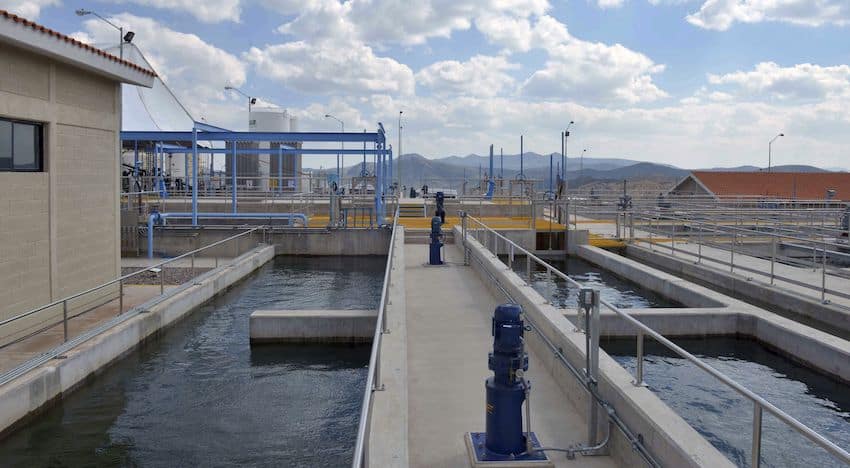
The El Realito dam, located in the Guanajuato municipality of San Luis de la Paz, is currently holding 12.2 million cubic meters of water, enough to guarantee supply at current levels, he said without specifying any time period.
“The rainy season starts in May or June. The storage levels in the El Realito dam will improve,” Martínez said.
He also said that Conagua is preparing a project to repair the leaks at the dam and that work has already begun on the faulty pipeline that transports water to San Luis Potosí city.
After Martínez’s presentation, López Obrador spent well over two hours answering reporters’ questions, and, in his customary fashion, augmented many of his responses with lengthy history lessons and pointed attacks on past governments and current critics.
For 20 or 30 years — he said in response to a question about the oil industry — Pemex spent half its budget in the north of Mexico when “oil is in the south.”
“Why this irrationality? Because of corruption, because [past governments] didn’t care about extracting oil; what they cared about was … handing out contracts, many of them to foreign companies,” AMLO said.
He later turned his attention to one of his government’s pet infrastructure projects.
The Isthmus of Tehuantepc trade corridor project — which includes the modernization of a railroad between Salina Cruz on the Pacific coast and Coatzacoalcos on the Gulf coast and the expansion of ports in those cities — is “very important, historic,” López Obrador said.
“… It’s a strategic area, it’s the narrowest part of [our] national territory, connecting the Pacific to the Atlantic,” he said before likening the project to the Panama Canal.
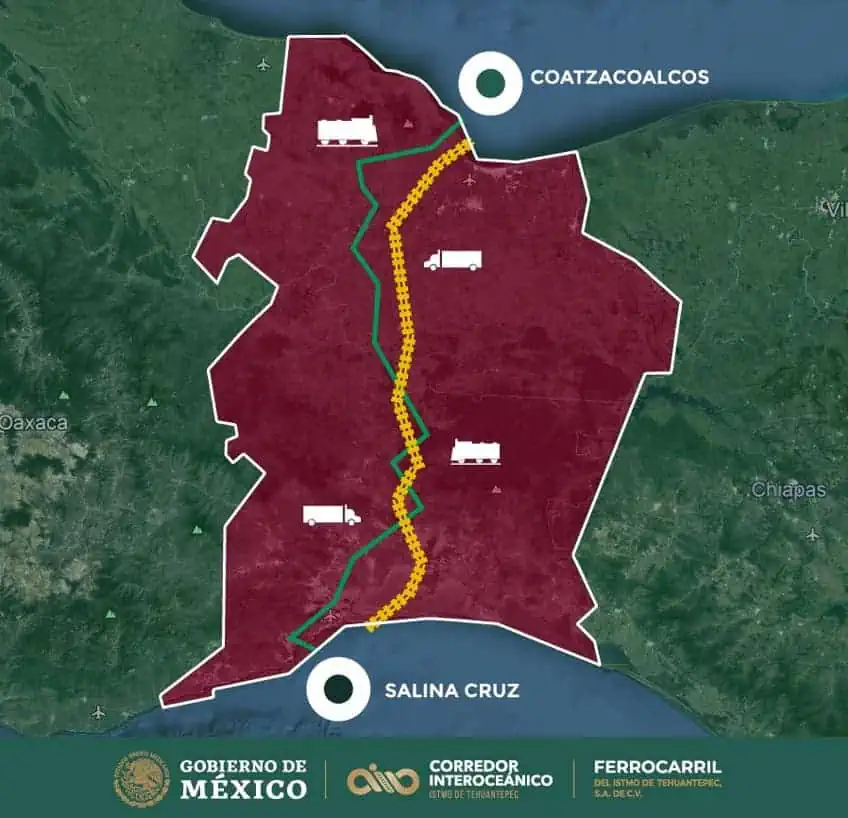
After a rundown on the history of that canal, during which he highlighted the agreements between former United States president Jimmy Carter and ex-Panamanian leader Omar Torrijos to ensure the U.S. hand over control of the 82-kilometer-long waterway to Panama in 1999, AMLO said that the isthmus project would link Asia to the Atlantic Ocean.
“This project will allow a more direct connection to the east coast of the United States from the countries of Asia,” López Obrador said, suggesting that Asian exports will cross the isthmus by rail before being shipped on to the U.S.
Toward the end of his Friday mañanera, the president revealed his government would shut down the state-owned news agency Notimex, which was created over 50 years ago.
“We no longer need a news agency in the government; that’s from the time of press statements and official press,” he said. “… It’s not something we need as a government, we have the mañanera.”
By Mexico News Daily chief staff writer Peter Davies ([email protected])
